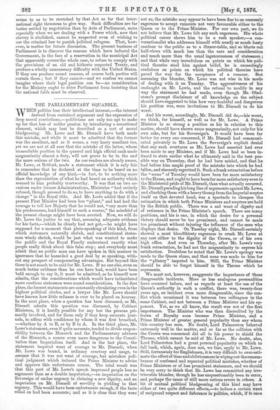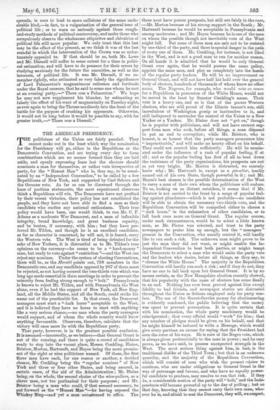THE PARLIAMENTARY SQUABBLE.
WHEN politics lose their intellectual interest,—the interest derived from sustained argument and the expression of deep moral convictions,—politicians are only too apt to make up for that loss of nobler passion by introducing a sensational element, which may best be described as a sort of moral bludgeoning. Mr. Lowe and Mr. Disraeli have both made this mistake, and while it must be admitted that the former was the assailant, and as it seems, a very hasty assailant too, yet we are not at all sure that the mistake of the latter, whose unassailable position in the quarrel and high official rank made magnanimity almost a duty, will not prove to be in the end the more serious of the two. As our readers are already aware, Mr. Lowe, at Retford, made a statement which it is only fair to remember that he declared at the time to be based on no official knowledge of any kind,—in fact, to be nothing more than the reproduction of what he had heard on authority which seemed to him probably trustworthy. It was that on two oc- casions under former Administrations, Ministries "had entirely refused, though pressed to do so, to have anything to do with a change " in the Royal title. And Mr. Lowe added that if the present First Minister had been less "pliant," and had had the courage to tell her Majesty that he would not, "any more than his predecessors, lend himself to such a course," the mischief of the present change might have been averted. Now, we will do Mr. Lowe the justice to say that, assuming adequate evidence for his facts,—which he clearly had not got,—he might have supposed for a moment that plain-speaking of this kind, from which statesmen naturally shrink, and constitutional states- men wisely shrink, would be just what was wanted to make the public and the Royal Family understand exactly what people really think about this false step ; and everybody must admit that no public man can have spoken in this manner in ignorance that he hazarded a good deal by so speaking, with- out any prospect of compensating advantages. But beyond this there is not much to be said for Mr. Lowe. If no one else, even on much better evidence than he can have had, would have been bold enough to say it, it must be admitted, as he himself now admits, that the considerations which would have intimidated more cautious statesmen were sound considerations. In the first place, the loosest statements are constantly circulating even in the highest political circles, and a lawyer like Mr. Lowe should have known how little reliance is ever to be placed on hearsay. In the next place, when a question has been discussed, as Mr. Disraeli admits this question was discussed, by Cabinet Ministers, it is hardly possible for any but the persons pri- marily involved, and for them only if they keep accurate jour- nals, to affirm with confidence by whom it was first broached, —whether by A to B, or by B to A. In the third place, Mr. Lowe's statement, even if quite accurate, tended to divide respon- sibility between the Monarch and the Parliamentary advisers of the Monarch, a course even more dangerous to the Consti- tution than Imperialism itself. And in the last place, the statement imputed want of courage to Mr. Disraeli, when Mr. Lowe was bound, in ordinary courtesy and usage, to assume that it was not want of courage, but mistaken poli- tical judgment which induced the Prime Minister to advise and approve this unfortunate course. The total result was that this part of Mr. Lowe's speech impressed people less as argument than as a double imputation,—an imputation on the Sovereign of undue urgency in claiming a new dignity, and an imputation on Mr. Disraeli of servility in yielding to that urgency. This would have been unfortunate enough, if the facts relied on had been accurate ; and as it is clear that they were
not so, the mistake may appear to have been due to an unseemly eagerness to accept rumours not very favourable either to the Queen or to the Prime Minister. For our own part, we do not believe that Mr. Lowe felt any such eagerness. His whole political career shows him to be a rash speaker,—a con- versationalist who addresses himself with nearly as much hasty candour to the public as to a dinner-table, and so blurts out half-views with much less than the care and consideration and much more than the usual ingenuousness of statesmen ; and that while very incredulous on points on which his poli- tical theories steel him against belief, he is exceedingly credulous on points on which his political theories have paved the way for the acceptance of a rumour. But assuming the blunder, Mr. Lowe was not wise in his mode of dealing with it on Tuesday. The aggressiveness of his onslaught on Mr. Lewis, and the refusal to modify in any way the statement he had made, even though Mr. Glad- stone's prompt disclaimer of all knowledge on the subject should have suggested to him how very doubtful and dangerous his position was, were invitations to Mr. Disraeli to do his worst.
And his worst, accordingly, Mr. Disraeli did do,—his worst, we think, for himself, as well as for Mr. Lowe. A Prime Minister in so strong a position as his in relation to this matter, should have shown some magnanimity, not only for his own sake, but for his Sovereign's. It would have been far better for every one concerned, if Mr. Disraeli had communi- cated privately to Mr. Lowe the Sovereign's explicit denial that any such overtures as Mr. Lowe had asserted had ever been made to any Minister, and if Mr. Lowe had so been in- duced to state earlier what he ultimately said in the best pos- sible way on Thursday, that he had been misled, and that he had before him ample proof of the mistake into which he had fallen, and sincerely regretted it. Such a frank retractation before the "scene" of Tuesday would have been far more satisfactory to the House, and ought to have been far more satisfactory even to the Ministerial pride of Mr. Disraeli, than what actually occurred. Mr. Disraeli parading his long line of arguments against Mr. Lowe, and clinching them with a heavy thump from the Imperial sceptre itself on that devoted head, was a spectacle to cheapen the estimation in which both Prime Ministers and sceptres are held by the British public. There was a sad want of dignity and of reticence in the Prime Minister's speech. There are many positions, and his is one, in which the desire for a personal victory should never be too prominent, and cannot be made too prominent without injuring the influence of the man who displays that desire. On Tuesday night, Mr. Disraeli certainly showed a most bloodthirsty eagerness to crush Mr. Lowe at any cost either to the dignity of the Crown, or of his own high office. And even on Thursday, after Mr. Lowe's very frank retractation, he had not the magnanimity to express his satisfaction. Doubtless he noted that Mr. Lowe's apology was made to the Queen alone, and that none was made to him for the "pliancy" imputed to him. Still, the Prime Minister should be able to forget himself in the Throne which he represents.
We must not, however, exaggerate the importance of these disagreeable incidents. More or less analogous personalities have occurred before, and as regards at least the use of the Queen's authority in such a conflict, there was, twenty-four years ago, an incident even more disagreeable, since the con- flict which occasioned it was between two colleagues in the same Cabinet, and not between a Prime Minister and his op- ponent. Yet, as we all know, the result was not of the first importance. The Minister who was then discredited by the frown of Royalty soon became Prime Minister, and a Prime Minister of greater general popularity than any whom this country has seen. No doubt, Lord Palmerston behaved extremely well in the matter, and so far as the collision with the Crown was concerned did all in his power to shield the Throne, which cannot be said of Mr. Lowe. No doubt, also, Lord Palmerston had a great personal popularity on which to fall back, which, again, does not, we fear, apply to Mr. Lowe. Still, fortunately for Englishmen, it is very difficult to over-esti- mate the effect of time and obliviousness in wiping out the remem- brance of confessed and repented political mistakes, whether of Prime Ministers or of less prominent statesmen, and we should be very sorry to think that Mr. Lowe has committed any irre- trievable blunder, though he has unquestionably been in error, and perhaps the cause of still more serious errors in others. A bit of mutual political bludgeoning of this kind may have either of two quite different effects,—to induce a certain want of reciprocal respect and deference in politics, which, if it once spreads, is sure to lead to more collisions of the same unde- sirable kind,—in fact, to a vulgarisation of the general tone of political life ; or to warn us seriously against these rough- and-ready methods of political controversy, and make those who scrupulously observe the wholesome etiquettes and chivalries of political life still more popular. We only trust that this last may be the effect of the present, as we think it was of the last scandal in which the intervention of the Crown was so unfor- tunately appealed to. If that should be so, both Mr. Lowe and Mr. Disraeli will suffer to some extent for a. time in politi- cal estimation, and will have to do penance for their errors by studying anxiously for the future the amenities, as well as the interests, of political life. It was Mr. Disraeli, if we re- member rightly, who estimated so very falsely the significance of Lord Palmerston's magnanimous reticence and fortitude under the Royal censure, that he said to some one whom he met at an evening party,—" There was a Palmerston." We hope he may not now supplement his blunder, by estimating so falsely the effect of his want of magnanimity on Tuesday night, as ever again to bring the Throne needlessly into the front of the battle for the purpose of crushing his opponents. Otherwise, it would not be long before it would be possible to say, with far greater troth,—" There was a Disraeli."



































 Previous page
Previous page